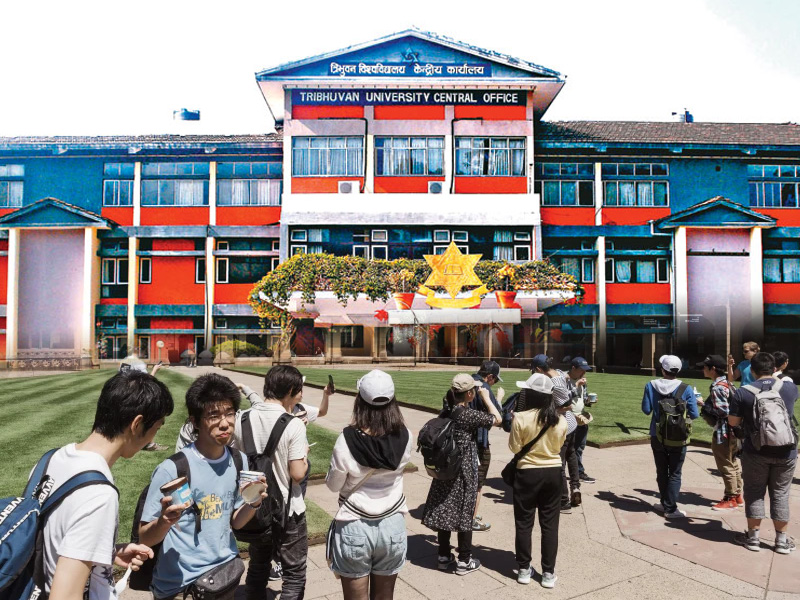Saturday 27th July 2024

In the run for qualitative education and the resultant good job prospects, many students across the globe prefer pursuing higher education in foreign destinations. And Nepali foreign education aspirants are no exception here.
The scenario in Nepal is such that Nepalis with a foreign degree are preferred over a Nepali student with a national degree.
This throws light on the existing curriculum and teaching methodology in the country. An overview of the past few generations knowledge gaining shows that the younger has not learned anything new than the older generations.
The Nepali education system has failed to provide the same educational standards that the global industry demands.
The current knowledge trend in Nepal is such that students are pursuing degrees not for the sake of knowledge gaining but for the sake of earning an undergraduate certification.
This in turn is creating a generation of individuals lacking self-confidence. Their lack of satisfaction in the jobs they take up in line with their stream of education is resulting in a lot of educated unemployment in Nepal.
While this trend is on the rise, Nepali employers are finding it equally difficult to find qualitative candidates who own problem solving and critical thinking skills.
Looking at what foreign universities have to offer, courses in foreign countries are research based, training students to be problem solvers. Research propels knowledge gaining and problem solving. The credit for such courses and curriculum goes to experts who design them after a lot of research and insight into the future and the current job industry requirements.
With this research-based approach, students who study at a foreign university are motivated to look for two or more references, enabling them to come up with unique documentation, supported with substantial proof.
On the other hand, the curriculum in Nepal doesn’t promote research and most of the knowledge gaining is done through model papers, referring to old Q&As and other learning material. Nepali students who produce material based on research are given lower grades in Nepal, when compared to their valuation in international universities.
However, this scenario is slowly changing and there is a steady rise of Nepali education institutions affiliated with foreign universities. The demand for students studying in such universities is very high as they are in a position to compete nationally and internationally.
International degrees challenge the intellect of students by getting them to work on a particular project or work area and gain a hands-on experience well in advance.
Even if students fail to secure higher grades, they at least have the knowledge, confidence and skill to tackle and manage complex situations at the work front.
The following factors pose a challenge to Nepal’s education system:
Nepal has witnessed a series of political upheavals in the last three decades. This has impacted the education system and has held it back from working independently.
Government support and the freedom for the education system to make critical decisions pertaining to the sector can majorly uplift the education system in Nepal.
Although the curriculum of Nepal is not completely backward, it lacks a practical approach to learning, where students are motivated to research, create and learn from their own experience.
Additionally, the education system is not strict with plagiarism and encourages students to rely and study only from limited material. Students in Nepal should be made to conduct research, gain hand-on experience and be given the choice to make their own decisions.
Many Nepali graduates are educating themselves only to get jobs. Instead, the education system in Nepal should encourage students to develop entrepreneurial skills and critical thinking skills and enable to become free thinkers.
Nepal’s education system should enable students to develop entrepreneurial skills and others to help them become more proactive in self-growth and national building in the larger picture.
The situation in Nepal is such that the society is divided into well-to do students whose families are financially sound and they go to foreign countries only to study a particular course and come back to run family businesses. However, this is a smaller majority.
On the other hand, there are a number of students who go abroad to seek permanent residence and then take up jobs in those destinations to payback their loans.
Students should come back to Nepal to help support the development of the nation. Foreign destinations are highly developed due to the knowledge and skill individuals receive in their respective nations’ educational institutions. These skills in return are utilized in the development of their countries.
Conclusion
It’s high time that Nepal considered a review of its curriculum and teaching methodologies. Only then will it be at par with the international education standards and provide a generation of capable, self-confident and knowledgeable individuals.
For more Nepal education news, visit NepaliSansar’s Education page.
Related Articles:-